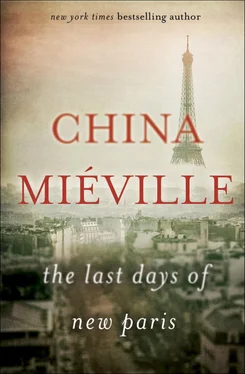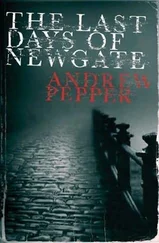Those who’d known them spoke about their times with those they thought gone. He had troubled his comrades, though, because Thibaut would tell no such stories of those who’d inducted him. He would say nothing. He fingered the Marseille card and thought of the scout who had come for him, whom he had turned away.
After his refusal, that woman who had crossed such dangerous ground to find him had not spoken again. Someone else might have begged, or insisted. There was a long silence, and he made himself meet her eyes, and when at last she was certain he meant it she turned without a word and ascended the stairs.
After a second’s hesitation he went after her. On the ground floor he had found Élise standing in confusion by a door that was ajar onto a backyard with a broken wall, the night and the streets, and the woman who had come unseen by any of his comrades now gone again the same way, back to whatever was being planned, without him.
Later the names. Hérold. Raufast. Rius. Iché. That sickening roll-call.
“But no,” he says to Sam. “I had to leave later. After the forest.” He looks down at the filthy nightdress he wears. “Yes, we found what we were looking for there. I mean, when we suspected the Brits wanted it, were after it, we wanted it more, didn’t we?”
A last chance. They woke one morning and found that Cédric had left. “Screw him,” Pierre had said, but they all knew they were weaker without the priest, if demons attacked. Thibaut unfolded the spy’s map and proposed a plan.
—
In New Paris, Sacré-Cœur wears a clotty skin of black paint, and thrusting meters out from all its splendid vaulted windows where glass once was and its doorless doorways are shifting tram-lines. Thibaut and his crew trekked to the shadows of the ex-church, to where tracks shook like lizard tails, lashing the pavement and the roofs with a grind and whiplash of metal, moving, appearing in the fabric of the area, grinding into the ground as if they were old infrastructure, stretching abruptly out of sight, twitching to change positions, disappearing again.
Every few minutes or hours, a tram would emerge from within and howl driverless out of the cavernous interior of the church and hurtle along one or other of these evanescent tracks into the city.
The Main à plume found a place to wait, climbed a ladder of sinewy muscled arms that wriggled under their weight, to huddle in a street-corner bivouac, watching manifs that watched them back, looking out for Nazis and devils. Things were bleaker now they suspected a little of what had failed. The cobbles shifted before them to become rails. They waited and spoke little and mostly just watched the ground change, watched the wrong trams.
Until after a day and a night, Thibaut, bleary-eyed, saw one streetcar come wormlike out and roll toward them, marked on its glass front, Bois de Boulogne.
“Now!” he said. “Now!”
The Main à plume came out of hiding running, swinging their grappling hooks, snagging the tram like a steer as it passed.
“Jean fell.” Thibaut recalls the wail and slide. “He was too slow. But the rest of us got aboard.”
They leaned exultant from rattling windows as the tram hurtled over graves and sent earth and headstones flying in Cimetière du Nord. Rails appeared before it and sank behind it into the earth. It explored and they hung on within.
Into the seventeenth, rue Ganneron, savaging a way through the remains of close edifices of rues Dautancourt, Legendre, Lacroix. The vehicle’s lights shone onto broken inside walls. Out again, over railways where rolling stock moldered.
“We went too fast to be caught,” Thibaut says. “Even when we went past Nazis.”
To their terror, the tram coiled abruptly down the stairs into the vaults of Villiers Métro station, leapt onto the older waiting track and into the tunnels. Through glints of phosphorescence and ghosts. Howling in the dark. The partisans were too fearful to be raucous until it rose and was out again.
At Porte Maillot the tracks the tram put down before it entered trees. Branches and leaves slapped the windows. They slowed. They were surrounded by the green. The engine stopped at last in a clearing, gently touching the buffers that grew to meet them out of the ground.
For two days the city fighters scouted by foot in that dream-wood, leaving the tram for the thickets. They wandered in rough extending circles, cutting routes, checking the dead woman’s map.
They caught two wolf-tables—the wild, skittish ones with foxlike parts—and used their wooden bodies to roast their flesh necks. Eating the meat of a manif was supposed to change you.
“What was it that took your comrades?” Sam says.
What monster does she think? A huge featureless manif woman holed by drawers that open to emit things? A clattering of Bellmer dolls crawling crablike on mannequin legs with ball-and-socket joints? Perhaps she imagines a squadron of devils and their Nazi invokers, SS torturers working with meters-high beasts bearded with stalactites of sulfur.
No.
They found the treasure at last, the pajamas marked by the star.
They were flapping on a hanger in a tree, dancing in the wind, watched by owls. Thibaut and his comrades paused at the sight of them in the shadowed moonlight, at the feel of them. They crept toward the gilt thread.
“I thought if they were anywhere they should have been in the Hauts-de-Seine,” Thibaut murmurs. “‘My pajamas balsam hammer gilt with azure.’” He quotes Simone Yoyotte’s poem, “Pajama-Speed,” from the pages of Légitime Défense. The cloth was woven with legitimate defense. “It wasn’t me getting them.”
Pierre was in front, reaching for the cloth, when a shot from the trees felled him.
“We all went for cover,” Thibaut says. “We’d been found. Followed. I don’t know since when. We left tracks, for sure. I was right behind Pierre. I grabbed the nightclothes.” He fingered their hem. “I pulled them on. So they couldn’t hurt me.”
What came for them out of the woods? What had tracked their incompetent scoutwork, using them to find this prize?
Not even Nazis in uniform. Not animals from art, nor howling transplants from Hell. Murderous banalities. French men and women, living by theft, killing by surprise. They jumped into sight, making what they must have thought were savage sounds.
Thibaut’s first poem-enhanced punch crushed a bandit’s face. Bullets pattered against him. For all his new strength, though, he saw in anguish that his comrades were dying, because he was still clumsy in these clothes.
He leapt an enhanced leap and overshot by many meters and fell down with the fight behind him. A ghastly comedy. A man knifed Bernard and another shot Brigitte in the back while Thibaut staggered and tried to come for them.
Two ambushers fell to Main à plume shots but the assassins had managed to filch a couple of Surrealist techniques, too, and as Thibaut watched, Élise cried out and was turned to cloud. He ran to gather her but she was vapor, and gone. Patrice was eaten by a flock of wooden birds at which he batted, and which he could not destroy. Thibaut struggled with his jerky strength as his comrades fell.
At last the surviving bandits ran. Thibaut sank to his knees in his armor, wearing the treasure they’d come for. He knelt among his dead.
“It wasn’t demons,” he says to Sam. “Nor manifs or Nazis. Just Parisians.”
I am going, he told himself at last when he stood up from his grieving, his slaughtered friends around him. This was what did it, not the unseen catastrophe of his leaders. This little local murder. I’m done. The mission is vacant.
He set out.
I’m done with this dream.
Читать дальше












